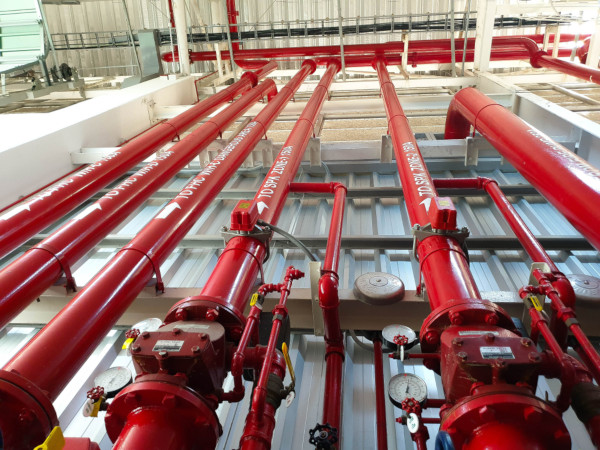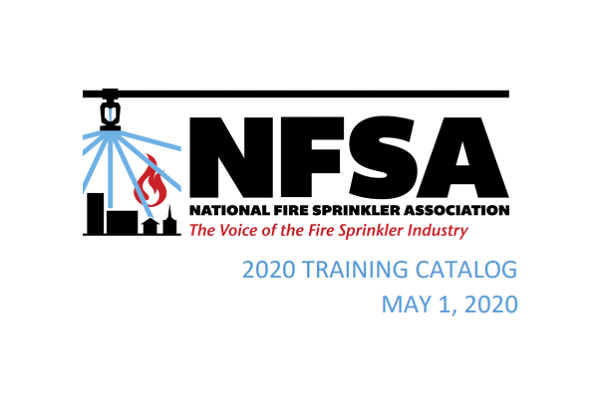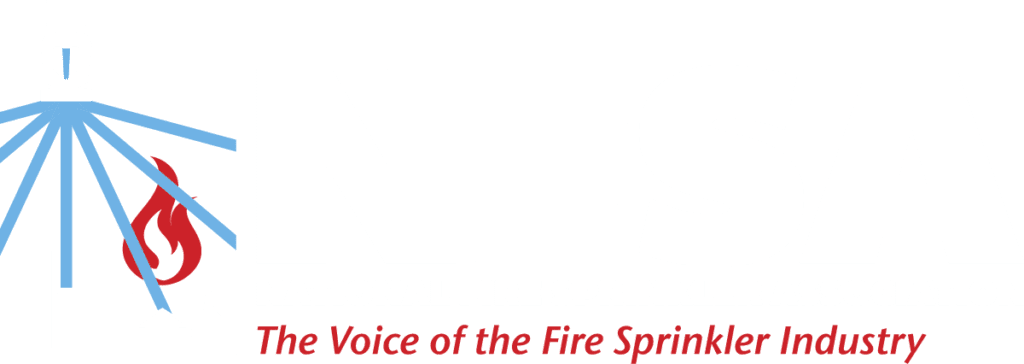Fire Sprinkler Training: NFSA is Your Premier Resource

NFSA courses help ensure fire safety—and grow careers in the fire sprinkler industry
Fire sprinkler training is essential to beginning, maintaining, and advancing a career in the industry. Whether you’re interested or already involved in the inspection, testing, and maintenance (ITM) of water-based fire protection systems or water-based systems layout, there are training and licensing requirements that must be met.
State and local authorities have various qualifications that sprinkler contractors must fulfill to legally work in each jurisdiction. These can include verified work experience, participation in apprenticeship programs, professional degrees and licenses, passing written exams, and a variety of certifications. Many companies across the country also prefer or require employees to hold certifications that demonstrate their professional competence.
At NFSA, we pride ourselves on being the industry’s premier resource for fire sprinkler training and education. No other organization provides as many training opportunities in as many sprinkler-related subjects. Well-known industry and model code leaders teach our courses. Additionally, our seminars are approved in most states for CEUs for building and fire officials, as well as licensure recertification accreditation and NICET credits. We are also an ICC Preferred Provider.
Whether you’re searching for “fire sprinkler training near me” or “online fire training,” NFSA has you covered. Let’s examine the importance of CEUs and NICET and ICC Certifications and how NFSA’s in-person and online fire sprinkler training will help you obtain them.
Industry certifications benefit workers, employers, and property owners
The National Fire Protection Association (NFPA) issues numerous essential model codes and standards designed to minimize loss of life and property by fire. But it does not specify exactly who can install or inspect water-based fire protection systems beyond stipulating that they be “qualified” to work on them and “knowledgeable and trained” to put them in—subject to the approval of the authority having jurisdiction (AHJ).
It’s up to local authorities to create and enforce licensing requirements for fire sprinkler professionals operating in their jurisdiction. Many state and local licensing authorities mandate that fire protection professionals earn and maintain relevant certifications.
Certifications from outside agencies also help property owners and employers ensure that they’re hiring contractors who are truly knowledgeable and exceptionally qualified. And these credentials can help fire sprinkler workers secure industry jobs and progress much farther in their careers.
NICET certifications are the gold standard for employers and government agencies alike
The National Institute for Certification in Engineering Technologies (NICET) programs are commonly required certifications by the state authorities who regulate fire sprinkler professional licensing.
Property owners often look for NICET certifications when evaluating standpipe or sprinkler contractors, and “the General Services Administration (GSA), which leases and owns space for more than one million federal employees and contractors, requires ITM technicians to be NICET-certified.”
To earn NICET certification, applicants must pass the appropriate exams, provide details on their relevant work experience, obtain supervisor verification of all performance levels, and, in some cases, obtain a personal recommendation. Specific requirements vary by certification type and level.

A list of states—plus the GSA—that require NICET certifications.
To ensure that certificants maintain their knowledge and skills long-term, NICET utilizes the Continuing Professional Development (CPD) point system. Every three years, certificate holders must reapply. To qualify for recertification, individuals need to pay a fee and have earned at least 90 CPD points since the prior document was issued. These points can be obtained through on-the-job experience, training, and other activities.
As a NICET Recognized Training Partner, NFSA provides training for the Inspection & Testing of Water-Based Systems and the Water-Based Systems Layout Technician Certification Programs.
In addition to helping applicants pass their initial NICET certification exams, NFSA training is an approved source of Continuing Education Units (CEUs) in many states. Each CEU is worth 10 NICET CPD points. If no CEUs are awarded for a training program, participants can count each hour of instruction as a single CPD point. Eighty percent of the required 90 NICET recertification points can come from Additional Education activities.
The ICC also oversees trade professional certifications
The International Code Council (ICC) is well-known for its model codes, but it is also responsible for “product evaluation, accreditation, certification, codification and training.” ICC’s Contractor/Trades examination program is designed to help licensing agencies recognize qualified and knowledgeable industry professionals.
To help applicants prepare for exams and maintain certification on an ongoing basis, the ICC has developed a Preferred Provider Program. As a member of this network, NFSA has been recognized by the ICC as a resource for quality training. Similar to NICET certification, ICC certificate holders are required to obtain CEUs on a three-year basis to sustain their status. At least a portion of these credits must be earned through training provided either directly by the ICC or through a Preferred Provider.
NFSA offers numerous in-person and online fire sprinkler training options
Most fire protection courses are created in-house, though we also feature some excellent courses from leading manufacturers of equipment. Training is designed and conducted by a wide range of fire protection professionals—engineers, high-level NICET layout and ITM technicians, certified building officials, master code professionals, and more.
NFSA training, both online and in-class, is approved for NICET credits. NFSA’s Tech Tuesday online presentations and all in-class seminars are also approved through ICC, and most state and local jurisdictions accept our courses for continuing education credits. If you have a question on whether NFSA training is accepted in your area, please contact your NFSA Regional Manager.
To register for any NFSA training seminar as a non-member, you must create an individual account before registering for a course through the event’s page. NFSA members can also access registration—at a discounted rate—after logging into their account. These accounts give you the ability to track your training transcripts, download online training certificates instantly, access additional course materials, and much more.
Online fire sprinkler training programs offer students the flexibility to work through the material at their own pace
NFSA offers many courses in a “virtual classroom” format where the attendees see the instructor and the material as though they were sitting in the classroom. It also delivers interactive learning modules that challenge the user through online assessments. In addition, NFSA provides many Spanish self-paced online learning opportunities.
No special software is required to participate in any of NFSA’s online courses—only an internet connection and a web browser are needed. Classes will be available on users’ dashboards within 24 hours after purchase. We ask that all recorded and interactive online training seminars be completed within 30 days from the date of purchase. All completed certificates will remain available for download after the class window has elapsed.
NFSA ONLINE CLASSES AVAILABLE NOW
NFSA also offers in-class, hands-on fire sprinkler training, taught by some of the industry’s finest experts
While COVID-19 canceled some opportunities earlier this year, all training from June on is a go based on state-issued guidance for easing social distancing. Seminars are offered all over the country throughout the year.
There are many options available, and if the topic you’re looking for is not being offered, please send us a request, and we will see if it’s feasible. We offer one-, two-, and three-day in-class seminars, as well as NICET prep seminars. Certificates are provided at the completion of in-class seminars. If you lose your certificate, you can request an electronic copy via email for a small administrative fee.

Our Advanced Layout Technician Training seminar covers many topics over three days including the spacing and location of storage sprinklers, hydraulic calculations (Darcy-Weisbach, Velocity Pressures, and Hardy Cross loop analysis), fire pump sizing (for situations with multiple pumps and cases with multiple water supplies), and a variety of other complex installation issues. Due to the advanced nature of the program, it is an excellent study session for those seeking NICET Level III and Level IV certification.
The purpose of the two-week Layout Technician Training Course is to take an individual with basic knowledge of math, physical science, and drafting skills and teach them to be productive layout and detailing technicians. All of the work elements necessary for NICET Level II Certification are covered by the course, including sprinkler selection, sprinkler spacing and location, obstructions to sprinklers, water supplies (public mains, tanks, and pumps), hydraulic calculation of sprinkler systems, and standpipe system layout and calculation.
We also offer a blended-format Layout Technician Training Course, which combines self-paced online modules, mentored guidance, and an in-class practicum component. During the 40-hour, self-paced online phase, students will read materials, complete online interactive lessons, and watch videos from leading experts in the fire sprinkler field. They will complete assessments and activities that reinforce the lessons, with the requirement that they master each unit before moving on to the next. Once this phase is complete, the 40-hour in-person Practicum Week will begin.
An upcoming Layout Technician Training Course takes place in Baltimore, MD, this August. Featured instructors may include, Kevin Hall, PE, Roland Asp, CET, Mike Joanis, PE, and Jeff Hugo, CBO.
Jeff is NFSA’s Vice President of Codes, Standards, and Public Fire Protection. He is a Michigan registered Building Official, Building Inspector, and Plan Reviewer and holds a multitude of certifications by the ICC, including the Certified Building Code Official (CBCO). Jeff also serves on several technical committees, including NFPA 1, IEBC, and NFPA 101 and NFPA 5000 Correlating Committees.
Mike is NFSA’s Director of Contractor Services. He is a University of Maryland, College Park fire protection engineering graduate and registered professional engineer in several states. Mike has served on committees that include NFPA 241, NFPA 1037, and applications for appointment to NFPA 13 (discharge criteria), NFPA 232, NFPA 241, and NFPA 909.
Roland is the Manager of Installation Standards for the NFSA. He is certified by NICET as Level III in the Water-Based System Layout program and serves as a member of the NFPA Committees on Sprinkler System Installation Criteria and Private Fire Service Mains.
Manager of Engineering Research for NFSA Kevin Hall has both a Bachelor of Science Degree in Fire Protection Engineering and a Master of Engineering Degree in Fire Protection Engineering from the University of Maryland College Park. He is also a member of SFPE and NFPA.
NFSA’s most popular courses include NPFA 25 training opportunities—online and in-person
- In the one-hour interactive NFPA 25 General Requirements ITM Series seminar, we address the general requirements that relate to the types of systems covered under the scope of the standard. These include who is responsible for ITM, necessary signage, required maintenance, notifications, what should occur when there are changes in occupancy, use, or materials, and other general requirements.
- Our unique, one-hour interactive NFPA 25 and 72: Coordinating the Work for Successful ITM seminar helps participants explore the issues and develop strategies to coordinate the work required by these two vital standards. This coordination is easier said than done. With a variety of administrative codes as well as varying frequencies and definitions used in the codes and standards overseeing fire protection, managing numerous stakeholders becomes critical to ensuring complete building protection.
- NFSA’s Understanding, Applying, and Enforcing NFPA 25 seminar is being offered virtually in July. The virtual classroom environment provides all the in-person experiences without the necessary travel, including a live instructor and question and answer sessions and participant interaction. This highly interactive seminar describes the requirements for properly maintaining a water-based fire protection system in accordance with NFPA 25. It clearly describes the responsibilities for compliance and record-keeping and the specific scope of the standard, and identifies the various ways in which information related to changes in a system are handled. It also outlines the various tables used in NFPA 25, their specific purposes, and when to use which tables.
- Rough and Final Inspection of Sprinkler Systems is a one-day seminar that provides attendees with vital information on how to conduct the field inspections for new fire sprinkler and standpipe systems.
- A one-day Sprinkler System Plan Review class is scheduled for July 28th in Houston. This course will provide a method of reviewing plans and other fire sprinkler documents that is efficient and thorough. Attendees will learn what documents to accept to start a review, what steps to take through the fire sprinkler design and systems review, and how to have confidence while reviewing hydraulic calculations.
VIEW MORE NFPA 25 TRAINING COURSES
Participating in an NFSA fire sprinkler training course is an excellent way to begin or accelerate your water-based fire protection systems career
By taking our high-quality, professionally led, industry-expert-approved courses, you can earn and maintain the certifications that make you a highly qualified—and highly marketable—professional.
Courses are available to all fire sprinkler professionals, but NFSA members get significant discounts on classes. For instance, one-day seminars are $325 for non-members and $175 for members, two-day courses are $630 for non-members and $315 for members, and online training is only $50 for members, whereas the non-member fee is $125. Similar discounts apply to nearly all of our offerings.
VISIT THE NFSA TRAINING PAGE TO GET STARTED
For over a century, the National Fire Sprinkler Association (NFSA) has served as the voice of the fire sprinkler industry. Our mission: advocating to protect lives and property through the widespread acceptance of the fire sprinkler concept. To join NFSA or learn more about the ways membership can benefit your organization, visit nfsa.org/join.

